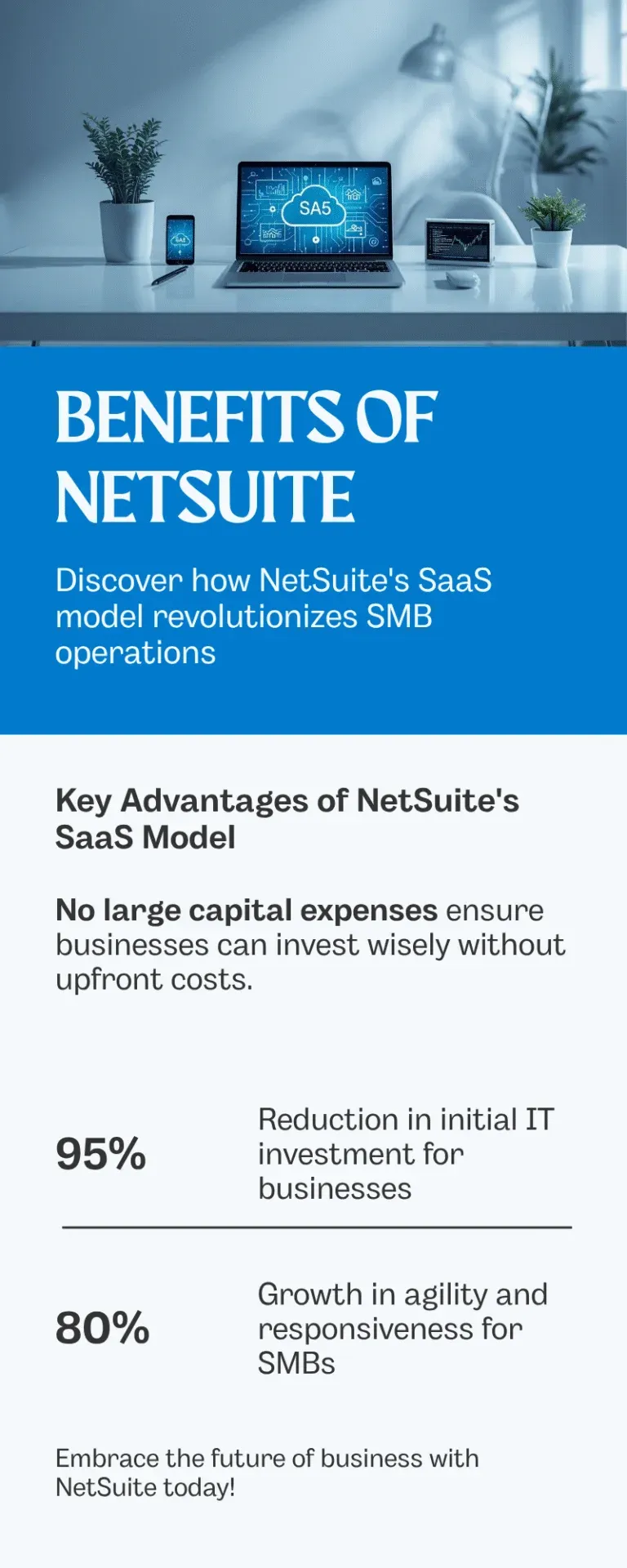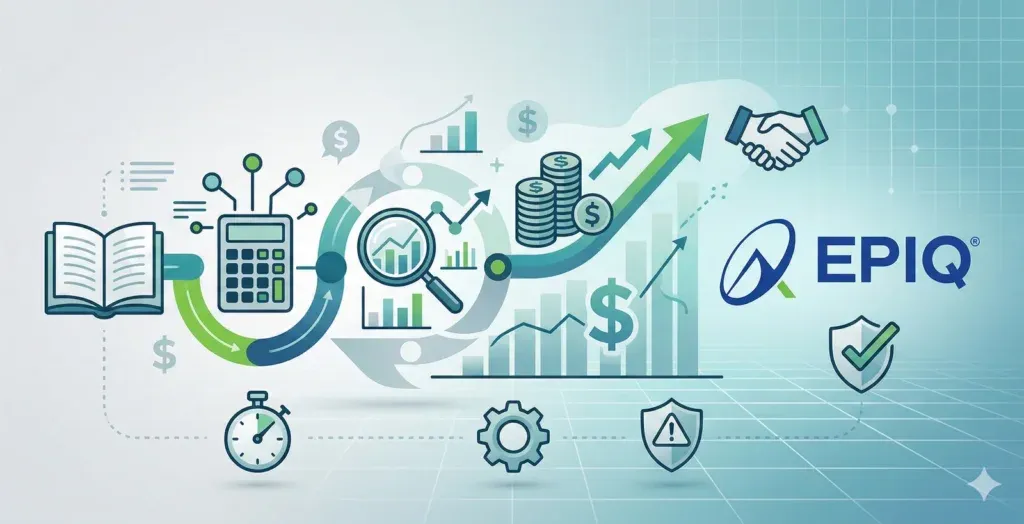For years, small and mid-size businesses (SMBs) have believed they are too small for ERP. Budget constraints, limited teams, and the assumption that enterprise systems are meant only for large corporations often delay digital transformation. But the reality is the opposite: SMBs need ERP even more urgently than large enterprises — especially in 2025’s hyper-digital, fast-moving market.
As a NetSuite Partner, we work with growing businesses that start with spreadsheets, basic accounting tools, and disconnected software, only to realize later that these fragmented systems begin slowing growth, hurting efficiency, and blocking scalability.
The Mint Jutras report “SMBs: Think You’re Too Small for ERP? Think Again” highlights the same truth: modern ERP is no longer a luxury — it’s the operational foundation SMBs need to compete.
In this blog, we break down why SMBs shouldn’t wait, how ERP delivers ROI, and why NetSuite is the most powerful, affordable, and scalable ERP solution for growing businesses in 2025.
The Myth: “We Don’t Need ERP Yet” — The Reality: It’s Holding You Back
Most small businesses start with enthusiasm, passion, and spreadsheets. That’s normal. But as you grow, manual processes and disconnected tools begin to work against you.
1. You’re Not in Control of Operations
When data lives across spreadsheets, WhatsApp messages, offline files, department silos, and separate tools like QuickBooks or basic CRM apps, you end up managing the business without visibility. Errors multiply, clarity disappears, and decisions rely more on guesswork than facts.
2. You Spend Too Much Time Searching for Data
If it takes hours or days to gather reports, reconcile numbers, or track order status, your systems are slowing everything down. This affects customer satisfaction, profitability, and your ability to forecast accurately.
3. Inventory Becomes a Constant Problem
Overstocking yet still running out, long lead times, missed delivery dates, and no real-time visibility — these issues drain growing SMBs.
4. Your Team Wears Too Many Hats
In many SMBs, one person handles payroll, admin, HR, procurement, and more. It’s risky and unsustainable. NetSuite automates 60–70 percent of administrative and finance tasks.
5. You Have No IT Team
This is exactly why cloud ERP exists — no hardware, no servers, no maintenance. Everything runs in the cloud.
The Digital Economy Has Raised the Bar
The report shows that over 80 percent of SMBs still depend on spreadsheets or manual processes, and only 20–40 percent have fully digital systems. Many tools also look digital but still require manual work.
In today’s market, customers expect same-day responses, real-time order updates, accurate inventory details, faster financial reporting, and smoother operations. You simply cannot deliver this consistently without an ERP system.
Why ERP Is More Affordable Now Than Ever
Cloud ERP removes the heavy upfront investment that used to hold SMBs back.
NetSuite’s SaaS model gives you:
- No capital expenses
- Pay-as-you-grow pricing
- Zero hardware costs
- Automatic upgrades
- Enterprise-grade security
- High scalability
The Mint Jutras report shows that SMBs achieve full ROI in about 27 months — often faster — thanks to fewer errors, improved efficiency, and time saved.
Why NetSuite Is the Best ERP for SMBs in 2025
NetSuite isn’t just ERP. It’s a complete business platform built for SMBs that want performance, visibility, and scalability.
1. One Platform for Your Entire Business
NetSuite replaces disconnected systems like QuickBooks, Excel, CRM apps, inventory tools, order management software, and reporting systems. Finance, accounting, inventory, CRM, procurement, orders, projects, and warehousing all sit in one reliable platform.
2. Real-Time Visibility for Better Decisions
You get automated reporting, real-time dashboards, role-based KPIs, custom alerts, and forecasting tools. No more manual reports or end-of-month surprises.
3. Automations that Save Hundreds of Hours
NetSuite automates billing, invoicing, approvals, bank reconciliation, inventory updates, order handling, reporting, and payroll integrations. Teams can finally focus on growth instead of repetitive tasks.
4. Ease of Use Without Complexity
SMBs value intuitive navigation, fast task completion, configurability, and mobile access. NetSuite’s clean UI and built-in automation make everyday work faster and simpler.
5. Built for Growth — No Re-Implementation Needed
NetSuite grows with your business. Add users, locations, subsidiaries, currencies, or eCommerce as needed. You never have to switch systems later.
Signs You’re Ready for NetSuite Today
You’re ready for ERP if you face any of these challenges:
- Heavy reliance on spreadsheets
- Inability to track profitability
- Manual, repetitive processes
- Slow, complex reporting
- Inaccurate inventory
- Systems that don’t connect
- Plans to expand or scale
- Overwhelmed teams
These aren’t future problems — they’re risks you’re already carrying.
Conclusion: Can You Really Afford NOT to Invest in ERP?
Many SMBs delay ERP because they believe it’s too expensive or too complex, or that they can manage without it. But modern cloud ERP is built exactly for SMBs.
Costs are manageable. Deployment is faster. ROI is measurable.
With a NetSuite Partner like EPIQ, you get expert guidance, smooth implementation, and a long-term roadmap for scaling.
If your business is growing, the real question isn’t whether you can afford ERP — it’s whether you can afford not to have it.

Frequently Asked Questions
Are SMBs really too small for an ERP system like NetSuite?
Not at all. Most SMBs outgrow spreadsheets and disconnected tools faster than they expect. NetSuite gives you real-time visibility, automated workflows, and tighter control without needing a large team or IT budget.
When is the right time for an SMB to adopt ERP?
If you’re relying on manual processes, struggling with reporting, losing time reconciling data, or dealing with inventory issues, you’ve already hit the point where ERP becomes necessary.
Why is NetSuite a better choice than basic accounting tools?
Tools like QuickBooks handle accounting only. NetSuite covers finance, inventory, CRM, projects, procurement, and reporting in one unified system so you don’t have to jump between apps.
Is NetSuite affordable for small businesses?
Yes. NetSuite’s cloud model removes upfront hardware costs, offers pay-as-you-grow pricing, and provides fast ROI through automation and fewer errors.
Do SMBs need an IT team to run NetSuite?
No. NetSuite is cloud-based. System maintenance, updates, security, and infrastructure are handled automatically.
How does NetSuite improve decision-making for SMBs?
You get live dashboards, automated reports, and accurate numbers in one place, which helps leaders act faster without waiting for manual data collection.
Can NetSuite help with rapid growth or expansion?
Yes. You can add new users, locations, subsidiaries, currencies, and even eCommerce without switching systems or re-implementing your ERP.
What business problems does NetSuite solve for SMBs?
It helps solve data silos, slow reporting, inaccurate inventory, manual finance tasks, workload overload, and operational blind spots.
How long does it take to see ROI from NetSuite?
Industry data shows SMBs often see full ROI within about 27 months due to fewer errors, faster processes, and better operational control.
Why work with a NetSuite partner like EPIQ?
A partner helps you plan the right modules, streamline implementation, reduce risks, and set up a scalable system tailored to how your business operates.







